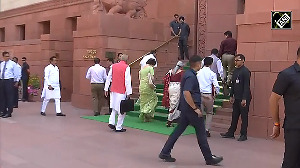Insisting that he was kept in the dark over Pakistan Army's Kargil aggression, former Pakistan prime minister Nawaz Sharief has said the then Pakistan Army chief General Pervez Musharraf and two other top military commanders toppled his government in October, 1999 as they feared their court martial for planning and executing it.
Also see: Kargil, Five year on
Currently in exile in Saudi Arabia, Sharief said Musharraf, by launching the military operation, 'sabotaged' the peace process initiated in Lahore in February 1999 between himself and Prime Minister Atal Bihari Vajpayee under which the latter had "agreed" to 'try and resolve the (Kashmir) matter by 1999'.
He also lamented that Vajpayee had started talks with the Pakistan government headed by a 'military dictator' and suggests that India should have 'waited for a time when a democratic set-up came back' in Islamabad.
"Initially, when the scuffle had started, Musharraf said it was the Mujahideen that was fighting in Kashmir, I thought since Mujahideen keep fighting, therefore, it is not a new phenomenon," Sharief said in an interview to India Today magazine in its latest edition.
He revealed, "Later, I got a call from Vajpayee saab, saying 'Nawaz saab, ye kya ho raha hai (Mr Nawaz, what is happening)? Your army is attacking our army. They are fighting our army'. I said there was no Pakistan Army fighting against his army... I suppose I should have known about all this. But frankly, I hadn't been briefed."
Noting that Vajpayee had asked him to pull back the army, as there was "a great pressure" on him to bring Indian troops out to the other sectors as well, Sharief said, "I thought this matter might become serious and this might be beginning of an open war between the two countries who had just detonated their nuclear bombs."
"This would be disastrous. I think, Vajpayee also thought it would be very dangerous and that is why despite being under pressure from his army he didn't bring his forces on the other sectors of the border," he said. "I kept telling him 'let us find a solution'."
Sharief insisted: "It was Musharraf who behaved irresponsibly and it was he who planned the whole affair".
Sharief said he had wanted to settle the matter directly with Vajpayee but it was Musharraf who was keen that he approach US President Bill Clinton to intervene.
The two-time former prime minister said he had later contemplated removing Musharraf 'straightaway' but had avoided 'this kind of action'.
"I felt the proper thing was to first appoint a commission and have a thorough investigation into the whole matter... While I was in that process, Musharraf acted on that and that is why he took the action against me," Sharief said.
"Musharraf and those two people, (Lt Gen) Mehmood Ahmed (Commander of 10 Corp) and (Lt Gen Mohammad) Aziz (Chief of General Staff). These three general were the main culprits who toppled my government. They all feared a court martial if an inquiry was conducted," he said.






 © 2025
© 2025